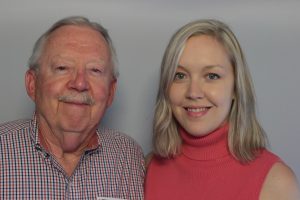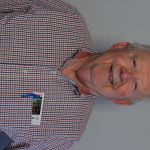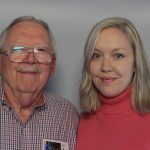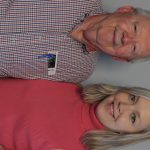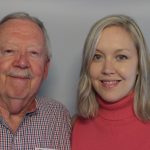Robert Brockfield and Samantha Brockfield
Description
Robert Brockfield (81) tells his daughter, Samantha Brockfield (32) about his childhood neighborhood and his service in the navy. He shares his favorite memories of Samantha as well as his hopes for her in the future.Subject Log / Time Code
Participants
- Robert Brockfield
- Samantha Brockfield
Recording Locations
National Underground Railroad Freedom CenterVenue / Recording Kit
Tier
Keywords
Subjects
Places
Transcript
StoryCorps uses Google Cloud Speech-to-Text and Natural Language API to provide machine-generated transcripts. Transcripts have not been checked for accuracy and may contain errors. Learn more about our FAQs through our Help Center or do not hesitate to get in touch with us if you have any questions.
00:05 My name is Samantha brockfield. I am 32 years old. Today's date is Sunday, May 7th 2017.
00:16 We are located in Cincinnati, Ohio and relationship to my printer is he is my father.
00:27 Hello, my name is Bob Brookfield and I'm 81 years old. Although I don't feel like it.
00:33 And today is Sunday May 7th. 2017, Cincinnati Ohio, which is my hometown and I'm Samantha's dad. Yes.
00:43 And I'd have to say one of the happiest moments in my life as when Samantha was born.
00:49 Actually, there's more to it than that when I proposed to my wife. She said maybe maybe if we can have children and so okay. I agree to that and Samantha as result of that promise.
01:08 Speaking of parents and my grandparents I never knew.
01:17 Because we have such an age difference between us so I was hoping you could tell me a little bit about who your parents were. And and what were they like I know they were in the greatest Generation live to the Great Depression. So how did that shape who they were and how they raised you.
01:43 My mother and father were industrious as a result of going to the Great Depression. My dad had two jobs most of his life. My mother was a stay-at-home mom with three children and she kept her busy and we grew up in Winton Place, which is a suburb of Cincinnati and my father also grew up and went and place the elementary school. I went to the same school as my father and my grandfather went to so the point is it very stable community.
02:16 And we all got along.
02:20 Sometimes I think about the race relations and I say we didn't have any problems. I was so surprised when we had a race riot in Cincinnati because I didn't think we hitting raise problems but it turns out we were segregated. It's just that my neighborhood was an all-white neighborhood and we were not very much turnover. I mean people didn't move and like we do today and so we all got to know each other and I thought that's why the whole world was.
02:51 So my mother and father met and work, which was a Gruen watch company here in Cincinnati on McMillan and
03:05 When they were dating my father lived Winton Place, my mother lived in north side, and there's a railroad track that runs between the two and another depression lot of paper walking instead of taking the bus earlier that card so Dad would walk down those tracks through Spring Grove Cemetery, you know.
03:25 So I was born in 1936 and in 1937. We had a flood.
03:31 And at flooded down my mother's neighborhood in Northside. Am I they were married it by that time and my father and
03:45 My grandfather built a boat and the garage and when they never flood waters came up Chase Street and Dane. They just rode the boat out of the garage fridge store in our family. So the point is your money problems. That's because they were not rich
04:15 That answer questions. That's great. I didn't I never knew that to worry about the specially the flood. That was a huge flood.
04:29 I'm so looking back. And I know that a lot of your greatest life lessons came from your time in the Navy. So what were some of the most important lessons that that you've learned in life.
04:47 In the Navy the lesson we learned is to watch each other's back. Any military is not just a Navy bent and a my friends watch my back and I watch theirs and that way we didn't really get in trouble.
05:03 And we would encourage one another and when people would make little arrows I'd say hey Brock, you can do better than that, you know coaching and my nickname in the Navy was Brock and runs people calling a phone. I asked her Brock, you know, it was in my Navy buddies. We still have reunions.
05:27 So is a great lesson in responsibility to
05:33 And we didn't do our job and they didn't get done while then I could be a failure in the mission.
05:41 So I'm sad that this up unto submarines if everybody has to do their part or else in the boat.
05:52 Yeah, Usher that way to
05:55 Musa great metaphor for teamwork
06:01 Like to tell you how I got in the Navy College campus.
06:15 Wabash is an all men's college and they sent a woman recruiter. And so we had to talk to her. She was very popular.
06:25 There's a lot of recruiter story is it basically go like they lied to me.
06:33 Well, I ask the recruiter if I want to get my first choice I do this day and she said if you do well in OCS that's officer candidate school. Yes, you'll get your first choice My First Choice was Hawaii because my Aunt Hilda lived in Hawaii and my uncle Carl served in the Navy when he was in World War II. I did get my first choice very happy about that. And I wish I was in Newport Rhode Island graduated from Wabash and Lake June 15th. And then June 29th. I had to report to a Newport not much time in there.
07:13 And so
07:15 My high-school sweetheart came to see us at the graduation OCS in Newport and I found out later that day. She was willing to marry me if I proposed to her.
07:28 But I was not ready. I would didn't wear this maybe thing was going to lead and so
07:36 I did not propose to her. I just went off to the Navien from OCS. I wrote her a letter and said I don't know what the future holds but I will contact you after this is all over which I did but by that time she had already married. No regrets there. I mean, I just wasn't ready. I think I grew up in the Navy and lot of ways and maturing and it was a part of the process.
08:10 Oh, I can also say this if you look at my yearbooks at my high school, I was yes, I was look very young.
08:20 So when I graduated from OCS and went on board the ship.
08:24 And Hawaii some of the enlisted men would say Excuse me, sir. How old are you?
08:31 And then not too long after that you climbed Mount Rainier and Mount Saint Helens was working on Tacoma Washington for warehouser company and other corporate headquarters great situation, and I was looking for some gold some something bigger to do and there was a group of people who are going to school. If you want to learn how to climb mountains and a part of that graduation exercise was going to climb Mount Rainier.
09:16 So I went through the program and we took the field trips and at the end of it we were ready to climb the mountain. Exciting but it's just one step after another, you know, it didn't seem especially glamorous at the time you started with a heavy pack but we had conditioning so we could carry heavy pack you set up a base camp and then from there he went up higher and then the next night you set up camp with a little and then you wouldn't have to carry it sleeping bag or a tent when they went to the crest. So people say what was on the top of the mountain nothing. That's not really I didn't expect any lot of people to climb the mountain and there and I got it set up. So it's very safe. Although we did cross the crevasses. So we had to be careful not to fall in like a rest. We were roped up on the team.
10:16 Three people and we scared an ice axe. And if somebody throat fell through the ice in the glacier the other two people to meet Lee sync to the ground and dig in so they wouldn't all Slide Away.
10:28 Maybe what I learned from mountain climbing was a matter of pacing yourself, you know, so that
10:38 Didn't carry too much weight. You didn't go too fast or too slow your learned how to eat and how to drink and so forth thinking of water. So take care of yourself. So that was like an endurance contest by the end of that. We felt like I could just carry so much and I pack your not like I could carry it toothbrush, but cut off the handle.
11:03 It was a good experience.
11:07 And then from from there, I know you've told me about your days in Silicon Valley in the sixties. And before before there were any sorts of Education Pathways or careers for information technology or anything like that. And there you were in the very beginning, right? What was that like
11:38 Well, I just say there is no schooling on computer programming IBM provide adult like on-the-job training.
11:50 Sell it it was at that time transitioning from the accounting department with the counting machines and punch cards to the computer and
12:05 It was and it was a lot of sacrifice involved because the machines so we're not big enough to do both development work and production work. So during the day today production work at night or did development and weekends. And so it was a lot of personal sacrifice involved in long hours. I would say
12:27 So I worked up some Southern Pacific Railroad. I got the job as a programmer. I don't make it's a long story. I'll just say I got the job as a programmer and
12:44 Southern Pacific was at the Forefront of using computers in the railroad industry and as a result officials from the other railroads would come and visit us and see it. You know, how how we did it and so we used to sing VIPs come through our department of computer programming my desk was in the front row along with said to my co-workers and it would stop at my desk and asked me what was my college major and they are expecting engineering or mathematics and mine was liberal arts. But I would tell them gelology Florida and so they asked the person to my left and her major was a French from Stanford very bright person.
13:33 We all respect one another and then they turn to the person on my right and said was your major home economics at stop.
13:45 But that's funny. We did get more professional long. But in the beginning we were all learning our ways.
13:56 And working together and we were fair-haired boys in the corporate world. They thought a lot of programmers and we were thought of ourselves as Craftsmen. In other words. We did this work at was our work. We put our name on it and if there's any problems with it, they would call us and did we just continue working in the same area? But it turned out to be a dead end, you know, if you continue working on payroll, then they don't choose you for doing marketing studies are things like that and so a lot of us got dead end and we didn't get much of a future. Unfortunately end it World War II made 20 programmers just could not find another job. It's the only thing about pioneers, you know, the Pioneers got there first, but I struggle to make a living.
14:51 So
14:53 As you know, I'm figuring out what I want my career to be and so what do you think about?
15:02 My future, what are your
15:07 Hopes and dreams for me and What will What Do You See Me?
15:13 Contributing I think you're off to a good start with you're interested in the community development.
15:23 That's a very natural Niche for you because you're good at working with people.
15:27 To discover what they need if you will in the way of what I'd say homes and so are the natural for you.
15:40 We could go on and talk about your tree planting project and Evan.
15:54 How much do you like to be remembered?
15:57 Do you ever think about
16:00 How do people what do you think?
16:04 Your legacy will be.
16:09 I would like to be remembered as friendly.
16:15 The people that I'm working with now on a part-time job, they regard me as friendly and it's easy for me to talk to them and did we do work together and they don't Anna and they respond to me that way.
16:31 I think everybody everybody all my friends always.
16:36 Your dad is so he's such a nice person to degrade a very friendly. I think you are known as friendly and you treat everyone with dignity and respect and I think that I learned that from you and I learned that for my father.
16:56 I'm so important.
17:08 And So speaking of
17:12 Treating others with respect and being friendly, what are some of the other what are the most important things in life that you hold dear in terms of your values?
17:26 Marriage and family until I hold
17:30 High regard and
17:35 So there's a lot of give-and-take involved in that or are you to make the family work you you may take a backseat in certain respects?
17:49 Hypothetically what if I want to buy a new car, but we can't afford it. Well, you just suck it up and say well for the good of the family I would do with it, I have other things like that.
18:02 One of the things I always looking back on growing up in the Way That You Raised Me.
18:10 That I think was different than my friends of the way their relationships with their fathers if I had a problem.
18:18 Or a decision to make and I would say Dad. I am in a pickle and you say okay. Let's sit down.
18:28 Go out to you know, McDonald's sit down and and dissect the problem and really
18:36 Look at all the different options and you would never tell me what to do. You would help me arrive at my decision. And I think that was very empowering for me.
18:49 I remember one time sitting down and talk to you but it was an Indian restaurant in Clifton and I was about to leave town because we're working in Chicago and
19:04 You told me you were didn't know how to pay your rent.
19:09 And I just happen to have that amount of money in my pocket.
19:13 Now that was just like preordained and so I gave you that money and you pay the rent and got out of a pickle remember that yeah.
19:28 How is wanted to be self-sufficient and I never wanted to ask for help. But if I you know what I was really in a bind, I always knew I could come to you would be there that had to dig me out of whatever right? I didn't know I've gotten myself into and you never made me feel bad about it either.
19:51 The speaking of let's see.
19:58 What is your favorite memory of me?
20:03 Or do you have one?
20:06 I haven't one of you at a very early age had been 3 years old and was your birthday.
20:13 And
20:16 Your mother made that special birthday cake. It was like a strawberry cake with the pink icing and the three candles on it and
20:27 About the time we got out on the table.
20:31 We got distracted with the doorbell. So she and I went to the front door where her folks were my in-laws and only came back in the room in front of you had dug into the birthday cake with a wooden spoon.
20:45 And we got a family picture of that. Do you smiling and this cake and a destroyed on one half of the
20:56 And I was smiling from ear-to-ear as a big grin is so happy and in-laws. My in-laws wanted us to spank you before the end of the cake that way we said no, that's her Kate. It's her birthday.
21:17 There is a magic moment because I thought it was formative. But you know, I'm glad we didn't spank you with that plan because you would withdraw, you know, you be insecure. I think you're more insecure person that is part of that bad being responsive what you do?
21:47 What are you thinking back about we've talked about a lot of different things. What are you proudest of?
21:56 What do you feel like with one of your greatest achievements?
22:04 What graduations are always a time to feel proud about your accomplishments to know?
22:12 And so I remember all my graduations, but the one I like best is your graduation from USC.
22:22 And that was such a hectic day. We came to pick you up and
22:31 It's all kinds of stuff going on and we had a hard time getting it out of your apartment it and say just get there on time and then we got divided, of course it a big UC graduation. There's all the graduates sitting at one part of the stadium and all the parents sitting somewhere else, but we caught sight of you. We knew where you were standing we could see you.
22:54 And then you went up to get your award and they got a nice picture of you smiling reaching on shaking hands with the president. So we have that it's hanging up in my room because one of my Goods close friends Ed committed suicide and his funeral was on the same day as my commencement under my cap and gown and then I Ducks. I got my diploma check the dean's hand and then
23:31 Stocks under the
23:34 Roped and left to go to this funeral is very it was a very Bittersweet day.
23:44 We knew that its graduation in the morning and funeral.
23:50 Stardance. I'm glad that you were there to help me get through it.
24:00 How has your life been different than you had imagined it?
24:11 I never really set goals are planned for certain life.
24:19 I could be criticized for that. My inhaler would often say how does he do it without a plan?
24:28 I didn't expect to go to the Navy. I explain how I got in there. I didn't expect it and up in San Francisco.
24:39 Call Great experiences that I could do.
24:47 I think I expected to.
24:51 Have a similar life to my mother and father without a whole lot of planning because the world is changing it.
25:04 So I expect it to work hard because I saw my mother and dad working hard and I thought if you work hard and you'll get the Rope rewards naturally sort of organic American dream. Do you think that that's still?
25:21 The case today
25:25 No, I don't.
25:28 I don't think so. I just think.
25:35 They are what should I say?
25:41 There's so much gained in there in the financial sector or people are in making money from
25:50 Stocks then comes on relations and IPOs, that's out of the reach of the Common Man and there's a brain drain and so in Silicon Valley you see a lot of the best rhymes for the rest of the world, but you don't see the Americans who are climbing up the ladder so much.
26:18 I do think that the are standard living is better than my parents dinner living and vice a versa. I mean my dad used to talk about the good old days and and say they weren't such good old days the days during depression Ware topping some of his friends would that would forget about that? So
26:39 What was the question again?
26:42 Do I think the American dream do you think that that is still a reality just as long as it's getting along and by and large we can still do that?
26:59 We can have our own homes and live in a secure safe neighborhoods. Yes, we can do that.
27:08 I feel sorry for people who can't I mean we know about the keto we know it's not safe place and people do have to live there somehow. I wish we could do a better job at a public housing.
27:24 Is there anything else that keeps you up at night or that that you're worried about for the country?
27:32 Infer in a my future and my children's I don't have children yet, but when I do their future
27:45 Do you think everything's looking looking up?
27:50 I think she
27:53 There is a part of the American dream left that is you could get a good education. You can get a good job and hang in there with the family support. Does it mean you're going to be a millionaire?
28:11 Have every car you ever wanted. I mean.
28:16 I do think the middle class is shrinking and I both hands.
28:21 So we're not sure where that's going.
28:24 It can be based on.
28:27 Manufacturing jobs leaving the country and I kind of feel like after World War II we had the economic boom and then we had the Auto industry and that all supported a standard of living which is going offshore.
28:43 I don't lay awake worrying about that. I do wake up sometimes in the middle of night worrying about stuff and what I do is write it down that helps me get to write it down.
28:52 But it's more of the things I've been involved in like a don't forget to do my Toastmasters.
29:05 Is there is there anything that you've never told me that you?
29:10 Would like to tell me now.
29:14 Are there anything that you?
29:16 I've wanted to ask me.
29:19 I want to know about me that you've never asked.
29:25 Well, I went to the best for you and I think you're on the right track think you're a very positive person smart.
29:34 And if you have the right kind of support, you'll go places.
29:40 Can't do it all by yourself. That's a good support for you, and it's a little early.
29:50 Thank you. I love you very much. Love you to Samantha.
30:02 Good how much?
